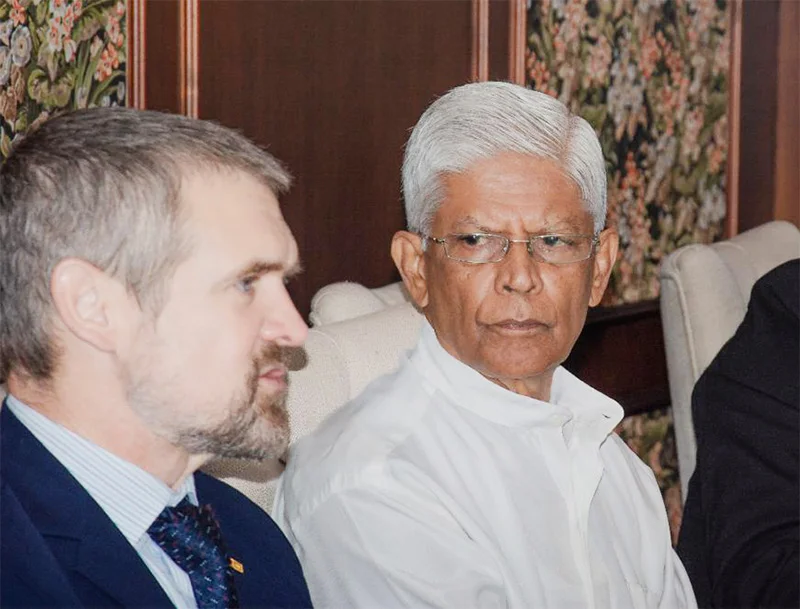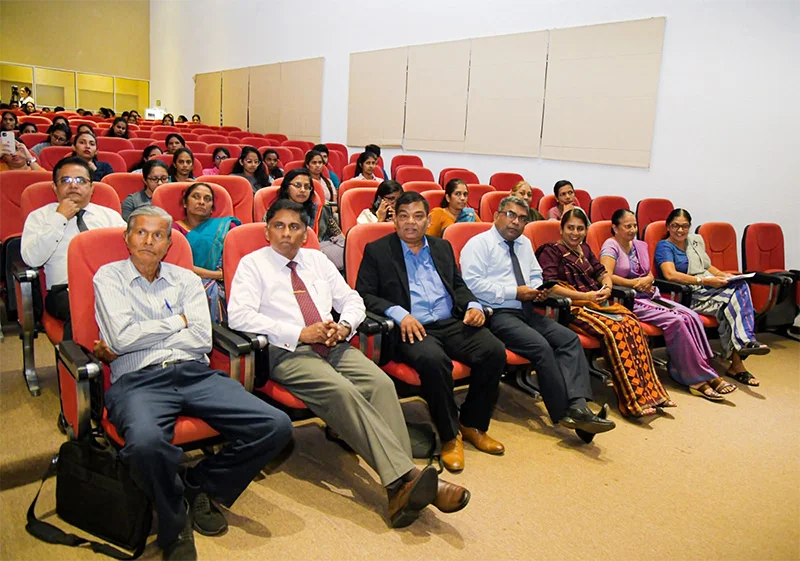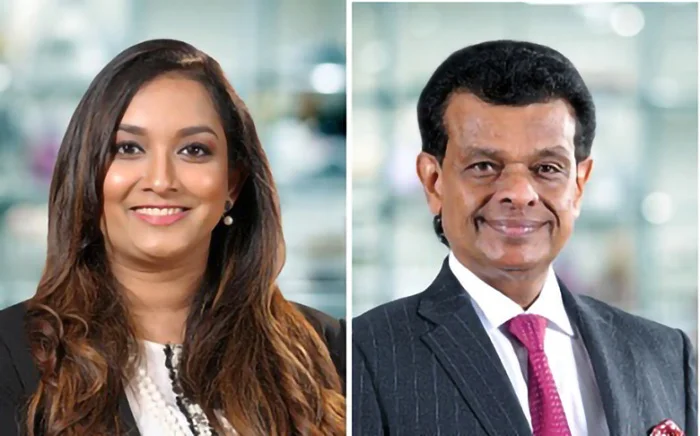Business
Sri Lanka, a regional hub for enhancing connectivity for the Daraz Group

The Daraz Group recently convened its strategic management meetings in Colombo Sri Lanka. The leadership teams and senior management from the Daraz’s offices in Pakistan, Bangladesh, Nepal, Singapore and Dubai met in Colombo for this forum where the Group strategy and direction for the new financial year was discussed and finalised.
Commenting on the opportunity, Managing Director of Daraz Sri Lanka, Rakhil Fernando opined, “We are honoured and privileged to host our counterparts and colleagues of the Daraz Group from the South Asian region, here in Colombo for a strategy planning workshop and integration conference. The event offered Daraz Sri Lanka and Sri Lanka a chance to showcase its potential as a regional centre for business events and conferences. This positioning can attract high-spending business travellers and foster professional networking, which is good for sector development and ultimately boosts the tourism industry as well. It is also encouraging that the teams across the region and the Daraz Group management are impressed by the talent in Sri Lanka and discussed expanding Daraz Sri Lanka into a central hub for Group interactions across the region.”
As a leading e-commerce platform in South Asia, Daraz recognizes the importance of regional connectivity and is committed to supporting the development of Sri Lanka as a regional hub. As part of this commitment, Daraz will bring together stakeholders from South and Southeast Asia to discuss opportunities for enhancing physical connectivity and promoting trade and investment flows within the region. By bringing together experts and stakeholders from across South and Southeast Asia, Daraz will convene forums and platforms for sharing knowledge, experiences, and best practices, and will help identify opportunities for collaboration and partnership. With its extensive network of sellers and buyers, and its expertise in logistics and supply chain management, Daraz will help promote cross-border trade and investment, and support the growth of small and medium-sized enterprises in Sri Lanka and across the region.
Founded in 2015, Daraz is South Asia’s leading e-commerce platform in Pakistan, Bangladesh, Sri Lanka, Nepal and Myanmar. It empowers more than 200,000 active sellers with world-class marketplace technology to reach the fast-growing consumer class in a region of 500 million people. Through Daraz Express and Daraz Pay, it operates the most efficient and digitalised logistics and payments infrastructure in its markets. Daraz’s vision is to be a champion of South Asia serving 50 million consumers and businesses by 2030.
For more information, please visit www.daraz.com
Business
How middle powers cooperate to achieve shared goals

‘Australia’s engagement with institutions, such as the Indian Ocean Rim Association (IORA) and “minilateral” platforms, including the Quad and the Combined Maritime Force, are practical examples of middle powers working together to address shared challenges ranging from ocean piracy to humanitarian assistance, Australia High Commissioner to Sri Lanka Matthew Duckworth said at a recent round table forum featuring the media and other important sections, held at the Colombo Club of the Taj Samudra Hotel on the topic ‘Middle Power Diplomacy.’
The forum was organized and conducted by the Pathfinder Foundation of Sri Lanka under the moderation of the latter’s Chairman, Ambassador (Rtd.) Dr. Bernard Goonathilake.
High Commissioner Duckworth underscored that such cooperation is not directed against any particular country but aims to preserve an open, inclusive, and rules-based regional order.
H.C. Duckworth acknowledged the reality of major power competition while stressing that Australia seeks stable and respectful relations with all countries, including Sri Lanka, cooperating where possible and disagreeing where necessary, without compromising core national interests.
Further, the H.C. focused on India’s evolving role in the Indian Ocean, the trajectory of China’s rise, the durability of the current global order, alliance dynamics, and Sri Lanka’s positioning in the Indian Ocean.
Responding to a question about India, the High Commissioner affirmed that Australia expects all major powers—India, China, and the United States—to act transparently and to respect the sovereignty of smaller states. On whether the current emphasis on middle-power diplomacy is a temporary shift or a long-term trend, the High Commissioner stated that middle powers must now play a more visible and proactive role in sustaining international norms and institutions.
H.C. Duckworth added that Australia invests in Sri Lanka in sectors, such as, minerals, renewable energy, textiles and education services. The High Commissioner reiterated Australia’s support for open trade and deeper regional economic integration, emphasizing the importance of economic resilience in a contested global environment.
The Pathfinder Foundation is a Colombo-based think tank dedicated to fostering informed dialogue on foreign policy, economic development and strategic affairs.
By Hiran H Senewiratne
Business
Green Minds: A new platform to rethink environmental governance in Sri Lanka

The Ministry of Environment yesterday launched a new knowledge-sharing platform titled Green Minds, aimed at strengthening environmental thinking and institutional capacity among public sector officials, at a time when Sri Lanka is facing mounting ecological stress and climate-related challenges.
The inaugural session of the monthly programme was held on February 12, 2026, at the Ministry auditorium under the patronage of Secretary to the Ministry of Environment, K. R. Uduwawala, with the participation of senior officials from the Ministry and its affiliated institutions.
Addressing the gathering, Secretary Uduwawala said that Green Minds was designed not merely as another training initiative, but as a thinking space for public officials to critically engage with emerging environmental concepts and global best practices.
“Environmental governance today is no longer limited to regulations and enforcement. It requires new ways of thinking, interdisciplinary approaches and continuous learning. Green Minds is intended to become a platform where officials can reflect, debate and update themselves on these evolving realities,” Uduwawala said.
He stressed that Sri Lanka’s environmental institutions must move beyond routine administrative practices and embrace knowledge-driven policy making, particularly in areas such as climate adaptation, biodiversity conservation, sustainable resource management and environmental justice.
The keynote lecture at the inaugural session was delivered by Senior Professor Siri Hettige, who spoke on the role of social sciences in achieving sustainable development in Sri Lanka. He highlighted the often overlooked social dimensions of environmental problems.
“Environmental issues are not purely scientific or technical. They are deeply social. Human behaviour, consumption patterns, inequality and governance structures all shape environmental outcomes,” Prof. Hettige said.
“If we want sustainability, we must understand society as much as we understand nature.”
He pointed out that many environmental policies fail because they do not adequately consider community realities, livelihoods and social power relations.
“You cannot conserve forests without understanding people. You cannot manage waste without understanding urban lifestyles. Sustainability is fundamentally a social project,” he added.
Following the keynote, a high-level panel discussion on strengthening environmental awareness brought together Prof. Hettige, Dr. Herath Vidyaratne, environmental policy analyst, Ravindra Kariyawasam, Adviser to the Minister of Environment, and S. C. Palamakumbura, Conservator General of Forests.
Kariyawasam said Sri Lanka was at a critical juncture where environmental decision making must be aligned with national development priorities.
“We can no longer treat the environment as a separate sector. It has to be integrated into economic planning, infrastructure development and social policy. Green Minds offers a space for officials to think beyond institutional silos,” he said.
Dr. Vidyaratne stressed that environmental literacy among state officials was essential in responding to complex challenges such as climate change, water scarcity and ecosystem degradation.
“The problems we face today are interconnected. Climate change is linked to food security, public health and migration. Officers need systems thinking, not just subject knowledge,” he said.
Meanwhile, Palamakumbura highlighted the importance of translating environmental awareness into institutional action.
“We have knowledge, laws and policies. What we need is consistent implementation and a shared environmental ethic across all institutions. Platforms like Green Minds can help build that collective responsibility,” he said.
He noted that forest conservation, wildlife protection and ecosystem restoration could not succeed without inter-agency cooperation and informed decision makers.
By Ifham Nizam
Business
Third quarter financials highlight 30% PBT growth for Aitken Spence in FY 2025/26

Spanning tourism, maritime and freight logistics, strategic investments and services, with operations across the region, Aitken Spence PLC, with a legacy of over 157 years, continues to pursue excellence. The Group recorded revenue of Rs. 67 billion for the nine months ending 31st December 2025, underscoring a robust performance across its portfolio of industries. The Tourism sector accounted for 68% of Group revenue, while the Maritime & Freight Logistics sector and Strategic Investments sector contributed 18% and 12% respectively. Furthermore, the Group’s revenue for the third quarter improved by 3.8%, reflecting steady performance across key sectors.
The Group’s total Profit Before Tax (PBT) stood at Rs. 5.6 billion for the nine months ending 31st December 2025, compared to Rs. 4.3 billion in the corresponding period of the previous year, reflecting a growth of 30%. Correspondingly, the Group’s Profit After Tax improved by 42% to reach Rs. 3.4 billion.
Sectoral Performance
The Tourism sector recorded the most notable improvement during the period under review, reporting a Profit Before Tax (PBT) of Rs. 2.0 billion for the nine months ended December 2025. This performance was primarily attributable to the sustained recovery and growth of the tourism industry in Sri Lanka. In addition, the sector benefited from significant improvements in profitability at the Group’s Maldivian resorts, as well as enhanced operating performance across hotel operations in India and Oman.
The Group’s Maritime & Freight Logistics sector was the largest contributor to Profit Before Tax for the period under review, reporting a Profit Before Tax of Rs. 3.3 billion. Sector performance, however, was moderated by lower volumes and margin pressures, particularly impacting overseas freight and airline operations. This was reflected in the reduced contribution from the sector’s equity-accounted investee for the period.
In the Strategic Investments sector, the key contributing segments of printing and plantations both recorded stellar performance for the period under review despite the challenging market conditions of these industries, while the power generation segment witnessed a steady performance with notable contributions from the Waste-to-Energy and renewable power generation operations. However, the significant losses incurred in the apparel manufacturing segment impacted the overall performance of the sector, resulting in a loss of Rs. 652 million at PBT level.
The Services sector recorded strong growth during the period under review, driven primarily by the expansion of operations at Port City BPO, the Group’s most recent investment. This performance was further supported by improvements in performance by the Group’s elevators segment. As a result, the Services sector reported a Profit Before Tax of Rs. 843 million, compared to Rs. 114 million in the corresponding period of the previous year.
The period was marked by notable achievements:
Aitken Spence PLC became the first and only diversified holdings company in Sri Lanka to have its climate targets validated by the Science Based Targets Initiative (SBTi).
-

 Life style2 days ago
Life style2 days agoMarriot new GM Suranga
-

 Business1 day ago
Business1 day agoMinistry of Brands to launch Sri Lanka’s first off-price retail destination
-

 Features2 days ago
Features2 days agoMonks’ march, in America and Sri Lanka
-

 Midweek Review6 days ago
Midweek Review6 days agoA question of national pride
-

 Business6 days ago
Business6 days agoAutodoc 360 relocates to reinforce commitment to premium auto care
-

 Opinion5 days ago
Opinion5 days agoWill computers ever be intelligent?
-

 Features2 days ago
Features2 days agoThe Rise of Takaichi
-

 Features2 days ago
Features2 days agoWetlands of Sri Lanka:













